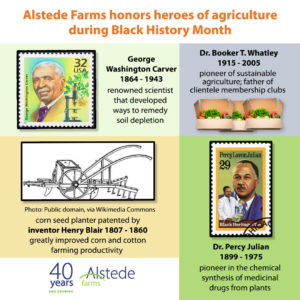Celebrating Heroes of Agriculture
Celebrating Heroes of Agriculture
Alstede Farms celebrates the heroes of Agriculture during Black History Month. Black history month is a time to remember and honor those important people and events in history. We begin by highlighting several unforgettable heroes who changed the face of agriculture as we know it today. We honor George Washington Carver for developing ways to… Read More »

George Washington Carver had many contributions to farming. You may know Mr. Carver for discovering hundreds of uses for peanuts during his lifetime. But did you also know that he was a pioneer and champion of crop rotation and soil conservation? His advances in peanut farming were brought on as a way of increasing the yield of cotton in the southern part of the United States.
Monoculture, which is the cultivation of a single crop on the same parcel of land, has a way of depleting soil nutrients, however, Mr. Carver discovered by alternating cotton and peanuts farmers saw an increase in their yield. Our farm utilizes these methods of crop rotation and soil conservation, still today, thanks to Mr. Carver. The next time you visit Alstede Farms, see if you can pick out which crops have been rotated from the year prior.
Dr. Booker T. Whatley was an African American horticulturist and an agricultural professor at Tuskegee University in Alabama. Dr. Whatley was a strong supporter of regenerative agriculture and a pioneer of inventive solutions for farmers with limited resources. Dr. Whatley created “clientele membership clubs” which can be seen as the beginning of the CSA (Community Supported Agriculture) model. This model empowers the farmer to seek the support of the local community to purchase a share of the farm, thereby assisting the farm efforts all year long, rather than generating income just at harvest time.
Dr. Whatley’s subscription buyer’s club offered smaller farmers an opportunity to market their goods directly to consumers. This allowed them to achieve success with a diversity of crops rather than competing with larger farmers and the monoculture-type farming going on at the time. This “smaller and smarter” strategy devised by Dr. Whatley encouraged smaller farms to grow higher-value crops and sell them directly to consumers who have an interest in making connections with food and how it is farmed. Learn more about Dr. Whatley on our blog written about this by clicking here.
Dr. Whatley also researched the benefits of growing small fruit production as a way of making income for low-acreage farmers rather than monoculture farming of cotton or corn. This support and interest in the success of small farmers paved the way for some of the fundamentals of farming today. His research on sweet potatoes, small fruits, and honeybees is another example of his understanding of small farms and what they need to be successful which he dedicated his life’s work to achieving. We honor and thank Dr. Whatley and celebrate black history month as we pay homage to Dr. Whatley for his dedication to changing modern agriculture for us today.
Mr. Henry Blair was born and lived in Glen Ross, Maryland in 1807. Mr. Blair was an African American farmer turned engineer who received two patents for his revolutionary innovations: the corn planter and the mechanical cotton planter. He is also noteworthy for being the second African American inventor to receive a U.S. patent. His invention of the corn planter helped farmers be more productive allowing them to plant more corn using less labor in a shorter period of time. His planter drawings show that this device was similar to a wheelbarrow that held a compartment for seed and had rake tools dragging behind to cover them. This allowed farmers to yield more crops and feed more people paving the way for the future of agriculture .
Mr. Blair, being an independent farmer himself, knew that improvements to planting crops was a necessity as this typically was the most labor intensive part of growing food. Mr. Blair used his farming experience to engineer this great invention despite many obstacles. Alstede Farms praises Mr. Blair for his contributions to agriculture through his inventions that helped improve the lives of farmers and food production that are still being utilized today.
Dr. Percy Lavon Julian was an American research chemist and entrepreneur who pursued outstanding achievements in the face of obstacles during his lifetime. Dr. Julian was a pioneer in the chemical synthesis of medicinal drugs from plants and was one of the first chemists to use plants for pharmaceuticals changing the industry as a whole. His research utilizing soybeans led to his publishing over 50 scientific papers featuring chemistry of plant alkaloids and sterols.
Dr. Julian lived from 1899-1975 and was responsible for synthesizing important medicinal compounds from abundant plant sources which made them more affordable allowing them to be mass produced thus making them more readily available and affordable to more people. Julian is most noted for his research on the synthesis of soybean sterols related to treating inflammatory health conditions which led to the innovation of the steroid drug industry’s production of corticosteroids. He also is noted for his research in protein extracted from soybeans which was ultimately used as a fire retardant saving thousands of soldiers lives in World War 2.
Julian was the first African American chemist inducted into the National Academy of Sciences and the USPS issued a commemorative stamp in his honor in 1993. We honor Dr. Julian for all of his achievements during his lifetime and for his amazing legacy to science agriculture that still impacts us all today. Thank you Dr. Julian for your advancements in agriculture and for highlighting agriculture’s importance in our world.
We are proud to have the opportunity to spotlight and celebrate the achievements that African Americans have accomplished and are grateful for their foresight and innovations to agriculture that are still being used today.







